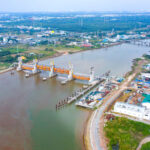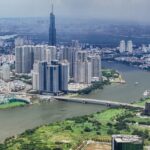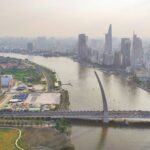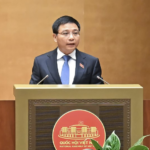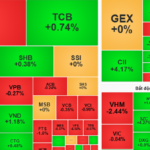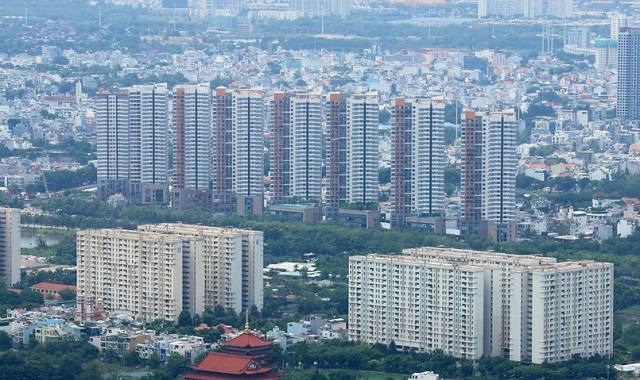 |
Ho Chi Minh City. (Photo: Hong Dat/VNA)
|
Ho Chi Minh City will officially operate under a two-tier government model with 168 wards post-merger, forming the largest economic and administrative center in the country, effective July 1, 2025.
To excel in its new responsibilities, the city has conducted training on utilizing land management software and issuing land-use right certificates (red books) for officials, public employees, and direct handlers of land-related procedures at the communal level and specialized agencies at the city level. A plan for effective management of local land resources in the coming time has also been established.
Mr. Nguyen Toan Thang, Director of the Ho Chi Minh City Department of Agriculture and Environment, shared that after the merger with Binh Duong and Ba Ria-Vung Tau provinces, the city now has over 5 million land lots.
With the expansion of its administrative boundaries, the demand for land transactions, transfers, registrations, and updates will surge. This calls for a well-organized, unified, and modern land planning, management, and red book issuance system, built upon a digital land database and an interconnected land information system that ensures accuracy and synchronization across localities.
Recognizing this, the leaders of Ho Chi Minh City, Binh Duong, and Ba Ria-Vung Tau agreed to employ a single software, VBDLIS, for red book issuance starting July 1, 2025. This software solution, developed and deployed on Viettel’s cloud infrastructure, aids localities in building, managing, storing, and operating land databases, as well as providing online public services related to land procedures. It enables citizens and businesses to complete administrative tasks online, such as land updates and red book applications.
By doing so, data accuracy and synchronization are ensured, and interoperability with other systems like the tax system is facilitated. Currently, the land databases of Binh Duong and Ba Ria-Vung Tau provinces are being updated on VBDLIS.
Mr. Thang also emphasized the crucial role of the communal level government as the direct provider of most administrative procedures affecting citizens’ lives, including land-related matters. Therefore, effective organization, management, and operation of the land database system are mandatory not only for specialized agencies at the city level but also require active participation and close coordination with the communal government.
To excel in this task, the Ho Chi Minh City Department of Agriculture and Environment conducted an online training session on handling applications for land-use right certificates based on the centralized land database for the People’s Committees of districts, Thu Duc city, and Ho Chi Minh City; the People’s Committees of the districts and cities of Binh Duong province; and the People’s Committees of the districts and cities of Ba Ria-Vung Tau province, extending this knowledge to the communal-level People’s Committees under the two-tier government model.
Through this training, officials and civil servants directly handling land-related tasks at the communal level gained updated knowledge and specific guidance on using the software to receive and process citizen applications via the National Public Service Portal. They also learned about updating and exploiting the centralized land database for land-use right certificate issuance and management, adhering to the regulations set by the agriculture and environment sector.
Moving forward, during the 2025-2030 term, the Ho Chi Minh City Department of Agriculture and Environment will focus on efficient land resource management as a pivotal task for socio-economic development. Land use planning, market-aligned land pricing, and the development of a land-use right market will serve as essential pillars. The city aims to expedite compensation, support, and resettlement through transparent auctions and land clearance for key transport routes following the TOD model.
Additionally, the city prioritizes the development of renewable and clean energy sources while improving air quality and effectively managing solid waste and wastewater. Notably, the Department proactively engages in refining the legal framework regarding land, environmental protection, and resource management in the merged locality, aligned with Resolution No. 66-NQ/TW dated April 30, 2025, issued by the Politburo on innovating the construction and enforcement of laws to meet the nation’s developmental aspirations in the new era.
With a spirit of innovation, strong political will, and determination, the Ho Chi Minh City Department of Agriculture and Environment strives to successfully implement the Central and City’s significant policies and comprehensively fulfill its assigned political tasks, thereby contributing to the city’s rapid and sustainable development in the future.
Hong Giang
– 13:55 26/06/2025
“Ho Chi Minh City Unveils Master Plan for Visionary Urban Development Towards 2060”
The Ho Chi Minh City Master Plan for 2040, with a vision towards 2060, is a comprehensive study that takes into account the regional connectivity and interrelation between Ho Chi Minh City and the provinces of the Southeast region. This master plan encompasses various aspects such as development models, population, land use, transportation infrastructure, and technical infrastructure, all woven into the fabric of the region’s urban system.
A Global City in Vietnam: Matching the Development Standards of the World’s Top Metropolises
The city will develop according to a polycentric urban model, with a focus on creating multifunctional urban divisions. This forward-thinking approach to urban planning aims to create a vibrant, diverse, and efficient city. By dividing the city into multiple centers, each with its own unique purpose and character, we foster a sense of community and belonging while also promoting economic growth and sustainability. This model ensures a well-rounded and balanced urban environment, offering a wide range of opportunities and services to its residents.
“Accelerating the International Finance Center’s Progress.”
“Ho Chi Minh City and Da Nang are expediting the development of international financial centers, marking a pivotal step towards Vietnam’s economic growth and global recognition. This ambitious endeavor underscores the cities’ commitment to fostering a thriving business environment, attracting foreign investments, and solidifying their stance as prominent economic powerhouses in the region.”



























